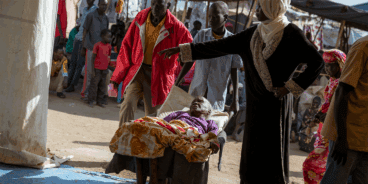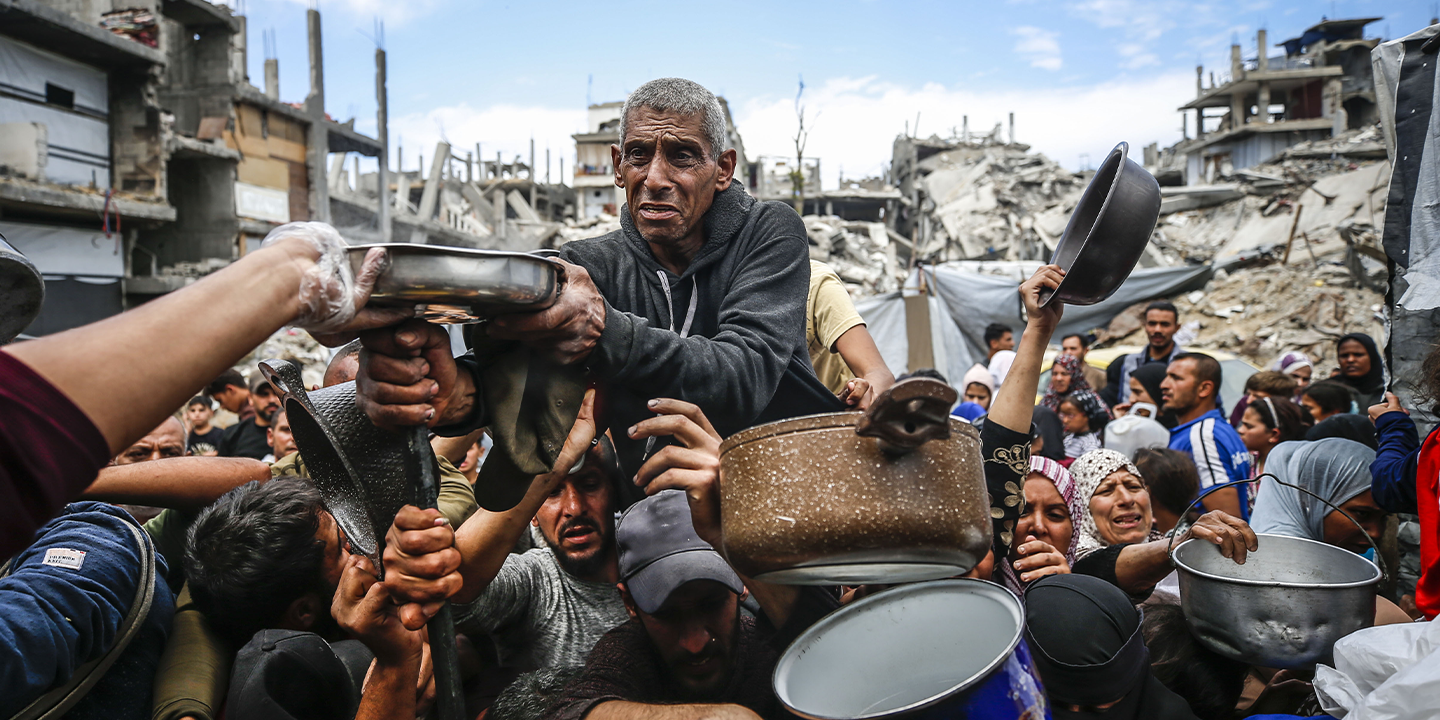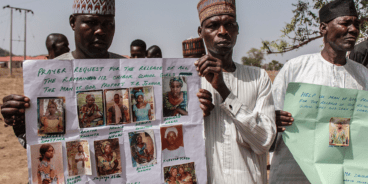

Atrocity Alert No. 437: Israel and the Occupied Palestinian Territory, Ukraine and Nigeria
Atrocity Alert is a weekly publication by the Global Centre for the Responsibility to Protect highlighting situations where populations are at risk of, or are enduring, mass atrocity crimes.
ICJ EXAMINES ISRAEL’S HUMANITARIAN OBLIGATIONS AMID ISRAEL’S AID BLOCKADE ON GAZA
On 28 April the International Court of Justice (ICJ) began hearings into Israel’s legal obligations regarding the provision of humanitarian assistance by UN agencies, other international organizations and third states in and in relation to the Occupied Palestinian Territory (OPT). The hearings – which will take place from 18 April to 2 May – are focused on a request from the UN General Assembly in December 2024 asking the ICJ to provide an Advisory Opinion on Israel’s humanitarian obligations following the adoption of legislation by the Israeli Parliament seeking to effectively outlaw the work of the UN Relief and Works Agency for Palestine Refugees (UNRWA). Forty states and four organizations will participate in the hearings.
For nearly two months, Israel has blocked the entry of all food, fuel, clean water and medicine into Gaza. Aid agencies, including the UN World Food Programme, have indicated that food stocks have now been completely depleted. Ammar Hijazi, Permanent Representative of the State of Palestine to International Organizations in the Netherlands, told the ICJ, “Starvation is here. Humanitarian aid is being used as a weapon of war.”
Israeli authorities continue to explicitly reiterate their resolve to weaponize aid, with the Defense Minister, Israel Katz, affirming on 16 April that the aid blockade on Gaza serves as one of Israel’s key “pressure levers” on Hamas. UN officials have condemned Israel’s “deprivation by design” through a total aid blockade, while the CEOs of 12 major aid organizations have issued urgent pleas to be allowed to do their jobs. Israel’s intentional obstruction of the entry and provision of life-saving aid constitutes the continued deliberate starvation of a civilian population as a method of warfare, a war crime for which the International Criminal Court has already issued an arrest warrant against Israel’s Prime Minister.
The UN’s Legal Counsel, Elinor Hammarskjöld, reaffirmed Israel’s continued unlawful presence in the OPT, stressing that legislation targeting UNRWA is Israel’s continued attempt to illegally exercise sovereign powers over the OPT. Dr. Ardi Imseis, Counsel for the State of Palestine, further stated, “UNRWA is the last hope that the Palestinian people, particularly in the Gaza Strip, have of surviving Israel’s genocide against them.”
Israel must immediately lift the siege on Gaza and uphold its affirmative obligations as an Occupying Power to facilitate the provision of humanitarian assistance. States must ensure their condemnations of Israel’s conduct in Gaza and participation in the ICJ hearings are accompanied by tangible and decisive actions, including through halting arms exports to Israel and imposing sanctions on Israeli officials.
CIVILIANS CAUGHT IN ESCALATING RUSSIAN STRIKES AMID UKRAINE CEASEFIRE PROPOSALS
In recent weeks Russian forces have intensified attacks on civilian-populated areas across Ukraine, killing dozens of civilians and wounding hundreds. On 13 April two Russian ballistic missiles struck the northern city of Sumy, killing at least 35 people and injuring 117 others, including children, in what has been the deadliest single attack so far this year. This assault followed the pattern of a Russian “double tap” strike, where an initial attack is followed by another targeting first responders and rescue workers attempting to assist victims.
Additional civilian harm occurred on 22 and 23 April, when the UN Office for the Coordination of Humanitarian Affairs (OCHA) reported that drone and glide bomb attacks hit densely populated areas throughout Ukraine. In the city of Zaporizhzhia, a glide bomb killed one person and injured at least 40 others, including seven children and a pregnant woman. OCHA also reported overnight drone strikes on 23 April that damaged protected civilian infrastructure in the regions of Dnipro, Donetsk, Kharkiv, Kherson, Poltava and Odesa, affecting a hospital, homes, warehouses and an energy facility.
The Head of the UN Human Rights Monitoring Mission in Ukraine (HRMMU), Danielle Bell, said, “The scenes of destruction and suffering in Kyiv this morning reflect a deeply disturbing trend – civilians bearing the brunt of ever more intense and frequent attacks.” Under international law, attacks on civilians, civilian infrastructure and humanitarian workers, including first responders, are strictly prohibited and may amount to war crimes.
According to the HRMMU, at least 151 civilians were killed and 697 injured from 1 to 24 April – marking a 46 percent increase in civilian casualties compared to the same period last year. The real toll is expected to be higher. This follows a 50 percent increase in civilian casualties during March compared to February 2025. Since the start of the full-scale invasion, at least 12,910 civilians have been killed, and 12.7 million people need humanitarian assistance as of March 2025.
Despite ongoing relentless strikes, international powers continue to exchange ceasefire proposals. At the time of writing, Russia has declared a unilateral ceasefire from 8-10 May and rejected Ukraine’s proposal to extend it to 30 days. The Global Centre for the Responsibility to Protect’s Ukraine expert, Sarah Hunter, said “While a variety of proposals have been exchanged, it is essential that any ceasefire centers the safety and security of Ukrainian civilians. Moreover, avenues for justice must not be forgotten as accountability and reparations for victims of Russian crimes in Ukraine is paramount for a lasting peace.”
SURGE IN ATTACKS HIGHLIGHTS FRAGILE SECURITY IN NORTHEASTERN AND CENTRAL NIGERIA
On 26 April at least 22 people, including 14 farmers, were killed in separate attacks by alleged Islamist militants in Borno and Adamawa states in northeastern Nigeria. Days later, on 28 April, another 26 people were killed when two vehicles detonated improvised explosive devices (IEDs) on the road between Rann and Gamboru Ngala, also in Borno State. The Islamic State West Africa Province (ISWAP) claimed responsibility.
The attacks are the latest in a long-running insurgency by Boko Haram and its offshoot, ISWAP, both of which have waged violent attacks in the region for over 15 years. These groups frequently target civilians and security forces using IEDs and have in recent years intensified attacks on farmers, fishermen, herders and loggers – often accusing them of collaborating with the Nigerian military.
In January 2024 Nigerian President Bola Tinubu pledged to “stamp out the remaining vestiges of Boko Haram, Ansaru, banditry, and kidnapping gangs.” While many believed the insurgency had significantly weakened amid a period of relative peace, the recent deadly attacks suggest otherwise. On 8 April Borno State Governor Babagana Zulum warned of a resurgence of Boko Haram. Speaking to security officials, he described an alarming increase in attacks and kidnappings “almost on a daily basis without confrontation,” raising concerns that authorities are “losing ground” on security gains.
Although military operations and internal divisions have previously weakened Boko Haram and ISWAP, the groups have escalated their attacks on civilian and military targets in Borno State this year. Earlier this month, ISWAP claimed responsibility for a series of deadly attacks against Nigerian security forces and Christian civilians in the northeast.
Meanwhile, populations in Nigeria’s north-central Plateau State are facing increased risks amid a sharp rise in inter-communal violence. More than 100 people have been killed in recent weeks, including more than 50 in two districts alone following back-to-back massacres. Longstanding disputes over land access between herders and farmers – fueled by climate change, illegal mining and land grabs – have intensified inter-communal violence. Authorities are struggling to contain the escalating violence in the region, while no arrests have been reported and the motives behind the latest attacks remain unclear.
While military protection for vulnerable communities is critical, it must be paired with efforts to address root causes such as poor governance, poverty and environmental degradation. Expanding reintegration programs and improving basic services in rural areas can reduce recruitment by armed groups. Federal and state authorities, working in coordination with regional partners, need to develop a unified strategy that combines security measures with political and social reforms – particularly amid Nigeria’s worsening economic crisis.
Related Content


Atrocity Alert No. 461: Israel and the Occupied Palestinian Territory, Global Landmine Report and Ethiopia
